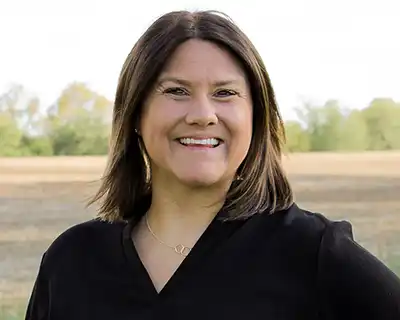As a global leader in crop protection, Syngenta is grounding themselves in practical, grower-based thinking to climate-smart solutions and believes now is the time for bold action to reach sustainability goals.
With more than two decades of experience spanning agricultural policy and agribusiness, Val Dolcini has seen, first-hand, the industry shifts that have placed us here at a time of greater understanding of climate and agricultural impacts and at a historic funding opportunity to accelerate the change needed to turn real action into measurable consequence.
While growers continue to rise to meet those demands every day, Dolcini says it is just the beginning.
“American growers and their counterparts around the world will continue to face significant challenges – in the marketplace and the environment where they grow and harvest their crops,” he says. “In the decades ahead, they’ll need to navigate the complexities of a rapidly changing climate, the need to further safeguard our natural resources, and a demanding regulatory environment, all the while trying to meet an increasing demand for food and fiber needed for a growing global population.”
Syngenta U.S. partners with America’s Conservation Ag Movement and Trust In Beef in a collaboration led by Dolcini and his team of sustainability strategists. They are driving the company’s efforts to ground climate-smart action in real-world, practical solutions that enable growers to build more resilient and sustainable mitigation strategies.
This work helps keep Dolcini and his team with an eye on the future. ACAM sat down with him to discuss those solutions and why he remains hopeful for a more climate-smart future for agriculture.
“Growers have a long history of managing change and adapting to less than perfect circumstances,” he says. “Syngenta will continue to be there as a partner with the tools, resources and services necessary to support growers in helping to maintain their productivity and profitability. I believe our expertise in designing innovative solutions, combined with the can-do attitude of our growers, will help ensure that American agriculture will not just survive but will continue to thrive and remain resilient during trying times.”

North America, Syngenta U.S.
During the course of your career, how have you seen growers’ attitudes toward conservation shift? What factors have you seen that have ushered the most amount of impactful change toward climate and sustainability? What are the current trends and future opportunities?
Growers are the original environmental stewards and have always been on the front lines of addressing global challenges. They know better than many what it means to protect the air, water and land necessary to cultivate and harvest a successful crop.
Throughout my career, I’ve seen growers’ perspectives on how a changing climate impacts their operations evolve rapidly but thoughtfully. Fires burn hotter, droughts last longer, storms are more violent and the list of climate-related changes goes on. Growers acknowledge the risk these conditions have on their bottom line and are looking at ways to make their operations more resilient and sustainable.
The most significant change I’ve noticed is an even deeper appreciation for conservation and a more nuanced understanding of how these practices can help their operations withstand harsh growing conditions. Growers are embracing these practices as essential, not secondary, components for preserving the natural resources that the world depends on in addition to helping protect the harvests that support their livelihoods.
But for every challenge, there is a corresponding opportunity. For example, we are noticing consumer preferences and regulatory requirements shifting away from more conventional methods of growing food toward a direction that puts less strain on our resources and preserves the land for future generations. It’s a great opportunity for our industry and Syngenta to lean into our sustainability work and support growers in adopting conservation practices designed to meet these demands.

How are the corporate sustainability initiatives of companies like Syngenta anchored in providing more tools for growers?
Syngenta has always supported growers in feeding the world. When we think about sustainability, our goal is to couple that fundamental goal with a portfolio of practical solutions to meet grower needs while achieving measurable sustainability outcomes. I believe we can play a critical role in solving the climate crisis so long as we continue to bring innovations and cutting-edge R&D to our customers. These investments will strengthen growers’ ability to manage ecological stressors and help us follow through with the sustainability targets we’ve set for ourselves.
Fortunately, making good on our commitments to provide sustainable tools and services is more possible than at any other time in history. We are living and working in the middle of an agtech revolution bolstered by new, almost daily, advances in science and technology. This renewed passion, energy and creativity will herald a new wave of solutions and opportunities unimaginable just a few short years ago.
You spoke of finding practical solutions as a key tenet for you personally. How are you helping to lead Syngenta down a path of making sustainability more practical for growers?
Sustainability, both economic and environmental, is a goal we want growers to prioritize for years to come, which means we’ve got to promote strategies that will make sense for them and their operations. What works for a strawberry grower in California likely isn’t the best approach for a large corn and soybean operation in Indiana.
We recognize that the grower perspective has to be at the center of this work. So, we’ve focused our efforts on crafting workable solutions for growers – utilizing their experience, feedback and insights to design solutions they’ll want to use and ensure we’re providing them with the right tools. If your only tool is a hammer, every problem looks like a nail. We can’t rely on one tool when the complexity of the challenge requires the entire toolbox.
Syngenta works with many value chain partners, including in coalitions like America’s Conservation Ag Movement. What role does collaboration play in ensuring growth in both awareness and adoption of climate-smart agriculture?
Strategic partnerships are the foundation for any progress we want to make on climate-smart ag or other sustainability goals. Syngenta has nearly 300 sustainability projects and partnerships with academic institutions, non-governmental organizations and industry partners around the world, underscoring our commitment to a collaborative approach.
A story that really brings this concept to life is our recent partnership with the Potato Sustainability Alliance, a pre-competitive collaboration of players throughout the potato value chain, such as potato growers, processors and other industry partners. After initiating a search for a turnkey sustainability reporting tool, PSA adopted Syngenta’s Sustainable Outcomes in Agriculture (SOA) standard and Cropwise™ Sustainability as their solution to help bring credible and actionable insights to over 550 potato growers across North America. I think the real strength of partnerships like this one is that it positions us to support a diverse set of players at scale and accelerate sustainable progress more quickly than we could alone.
What role does sustainability play in Syngenta’s research and development? How are you ensuring that the new tools you bring to market advance a producer’s toolbox and align with sustainability goals?
Sustainability initiatives have a natural home in Syngenta’s R&D strategy. By 2025, we will have invested $2 billion in sustainable and conservation ag innovations – investments that will help to drive our sustainability commitments and create new opportunities for American growers.
One way we’ve invested in the grower’s toolbox is by empowering them with opportunities to communicate their sustainability story and share results directly with their business partners across the value chain, leading us to develop our Sustainable Outcomes in Agriculture Standard and embed it within the Cropwise Sustainability application.
The value for American growers is that we can generally return some time they would usually spend completing bulkier assessments and providing access to a platform that enables them to communicate more seamlessly across the value chain. Over time, we believe it’s going to open doors for producers looking to demonstrate their commitment to sustainability with even more stakeholders, partners and consumers.
There is significant investment of both time and capital in reshaping policies for conservation right now. During this historic focus on sustainability and the need for public/private integration, what do you think that Syngenta has to offer? What challenges do policymakers face, and what is the role of the private sector to help find solutions?
Beginning with the Good Growth Plan, Syngenta has been on its own sustainability journey for some time now, and we’re really proud of the numerous projects, partnerships and outcomes we’ve achieved so far. However, the increasing impacts of climate change will require that we respond similarly in size, scale and ambition. We live in a time of real opportunity that favors the bold and demands change. It’s a historic moment for all of us to enter the public arena and offer practical solutions that have been road-tested by companies and customers.
As I noted, collaboration is key to addressing these challenges, which includes our continued work with policymakers to develop sustainable policies and programs. One major challenge to exploring all the potential solutions being discussed and debated is timing and the need to respond quickly. We believe the time is right for the private sector to reimagine how we might craft policy solutions, forge new partnerships and work alongside public agencies to benefit society. More specifically, I think Syngenta is uniquely positioned to leverage our expertise and lead the conversation about the benefits of conservation agriculture and the many innovative solutions that can help us grow food more sustainably.
Like many others tracking the climate crisis, we have more than enough data to predict where the world is headed. My hope for our future is that we’ll be courageous enough to chart a more sustainable path.



